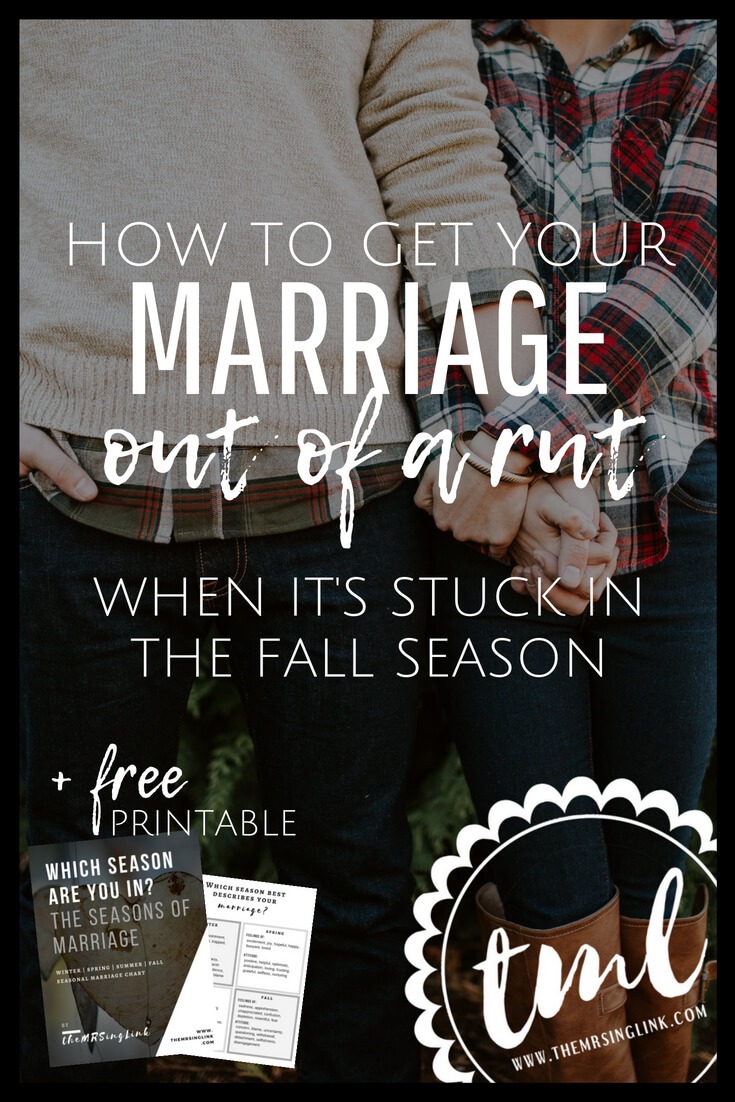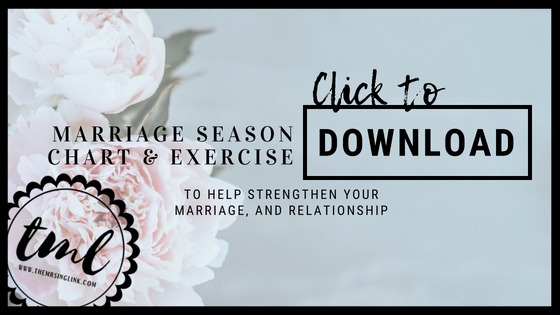
For Christmas, my husband got me a couple books on marriage. Yes, we’re one of those couples. Not because we need the help – we find there is always room for learning and improving in a marriage. Even in our summer season. Speaking of seasons – that’s what one of the books is called, The Four Seasons of Marriage (Buy it) by Gary Chapman. If you haven’t read it, you absolutely should.
I find that reading it has given me a new perspective on what is to come – that we have yet to experience in our marriage. Not to say we are better preparing ourselves, but in a sense to not feel blindsided by the change in seasons that occur. Of the four, Fall stuck out to me the most – simply because of its “fork in the road” meaning. Some would describe Fall as the “stuck in a rut” category, or the emotional or physical drifting pattern within the marriage.
Either way, each spouse senses the “changing of the leaves”, the drifting pattern or the issues pertaining to the rut – though the changes and issues are not being handled directly. Some of the qualities associated with the Fall season may be lingering feelings of fear or discouragement, concern or uncertainty, or neglect in various aspects of the marriage. Fall is that teetering bridge with only two directions to go. And I want to shed some light on things you can do to get your marriage unstuck and out of that rut.
how to get your marriage
out of a rut
[when it’s stuck in the fall season]
Do a little self reflecting
Try to figure out why you feel the way you do – on your own. Take some time to sort out your emotions and attitude towards the marriage, and what could be the underlying cause(s) for it. Sometimes getting to the root – rather than simply plucking it’s leaves and branches – of what is hindering your marital goals from reaching Spring and Summer seasons will help move your marriage forward.
Is it truly something within the marriage? At times we fail to realize that our internal selves, or life’s impact from the outside can have an effect on your place in the marriage. Instead, we continue to stumble upon the little things we think are the problem, only to be masking over the real issue.
Talk it out once and for all
Maybe to your spouse the marriage is great overall in their eyes, which makes you think, “Then why do I feel differently?” It doesn’t mean your emotions and attitude toward the marriage no longer matter, and it certainly doesn’t mean you are the reason for the cause. And if the issue has gone under wraps, then that is only forcing the issue deeper “under the rug”, and you should already know what happens when you continue to add to that dust pile over time.
Surface it – bring your attitude, feelings and reflection of the marriage to attention. Good or bad, a major aspect in marriage is being open to talking about certain arising concerns with one another – even if concern is one sided. It may seem as though this is the process of being “needy” or “naggy”, but honestly if there is healthy communication within the marriage it will never get to that point. If communication seems to be the major issue here, read more on the vital communication skills that can save your marriage.
Stop the blame game
Whose responsible, or the cause of what, never truly matters – that route never actually solves any issue, if you think about it. Pointing blame is the back hand swing to validating your feelings by inflicting your pain on the other side of the court. “It’s your fault that you don’t care to remember our one special day!” points blame, while instead you could say, “I feel hurt that you forgot our anniversary.”
If you read Gary Chapman’s book, The Four Seasons of Marriage, he states that most couples can readily identify our spouse’s failures much more than our own. Failures, including our own, need to be identified (not table-turned!). The importance of resolving issues, and past issues, is ultimately allowing ourselves to admit our own failures, and allowing forgiveness for our spouse’s failures.
[mailerlite_form form_id=6]
It’s all about attitude
Negative behavior follows a negative attitude. Allow a minute to take that one in.
Ok, so – what I’m saying is, yes, we can allow our negative feelings and emotions to dictate our attitude and behavior in the marriage. Right – would you agree – that what we think and feel greatly influences what we do and how we act? The key issue is being able to recognize a negative attitude, and the ability to identify it as the catalyst to failure within the relationship.
I would say this is my biggest fault in my marriage. My husband is such an optimist – I’m generally not so – as I have more practical, over-analytical qualities. He’s the “glass half full” kind of guy – while I wish I saw life more that way. In turn, these qualities greatly affect my attitude in certain obstacles in our marriage. The most difficult part for me is identifying my negative attitude in order to stop negative behavior from following.
It’s not what we’re dealt in life (as far as obstacles, hardships, etc.) – it’s how we interpret it. And how we interpret everything is the fork between success and failure, especially in a marriage. So thinking more positively will account for a positive attitude (and behavior). Which, if you think in terms of marriage, can be quite difficult to do. As I mentioned in a previous post, on Why Being Married Is Awesome, its common to allow the bad to outweigh the good in our marriage. It’s important that we acknowledge our spouse for all their good qualities, focus on those positive traits and verbally express appreciation to our spouse.
Listen to and engage with each other’s needs
Ultimately, failure in communication is likely what brings most marriages into fall and winter. We hear the phrase, “Put yourself in someone else’s shoes” all the time. That phrase is formerly known as empathetic listening. Literally meaning “To see the world from their perspective, and seek to understand their thoughts, feelings, opinions, and desires.”
As Gary Chapman says, “We’re naturally very egocentric beings.” It is all about me– how everything affects me, how I interpret things, the way I see things, what I believe, feel, need and desire. We, as human beings, simply want to be heard and understood. We don’t necessarily have to be in agreeance on everything, but we want the openness of our feelings and emotions validated and our thoughts, views, opinions, beliefs and desires to be of equal importance. That’s what we fail to recognize most in communication. Or, reality is – we want it, yet we have a difficult time giving it in return.
Notice, especially to the spouse who says, “He/She complains all the time…”: behind every complaint are one’s hidden desires.
Learning empathetic listening does require a change in our attitude, and making the conscious choice to accept, understand, validate and empathize with our spouse. But it can do wonders in creating an open, inviting and vulnerable environment for you and your spouse on resolving your differences.
If this is a mighty challenge for you, start by implementing the above first.
Don’t thrown in the towel
And like with anything, just because you fail to succeed the first time around – don’t give up! There will be many failed attempts, trial and errors, mishaps and downright disappointment. I was heart-stricken at the very thought of my marriage susceptible to entering Fall and Winter on more than one occasion. It is the natural likelihood in every marriage.
Winters may be short, and fall may stick around longer than you’d like, but the seasons of marriage are ever-changing. As long as both spouses are open, aware, and making the honest effort to make a change for the better (through empathetic listening, and so forth) – it’s always a step in the right direction.
Connect with me on Twitter, Instagram & Facebook so you don’t miss the latest blog updates!
When in doubt, strive for your spouse’s success
Believe it or not, as a spouse, we are the biggest contributions to our spouse’s successes – and failures. Our purpose is not to focus on what our spouse can do for us, or to treat the quality of our marriage as Tit-for-Tat – “I’ll do this if you do that.” It’s our duty to strive for our spouse’s highest potential – to do so means to give the very best of ourselves, without any conditions. This could be with encouraging words, acts of service, being supportive (emotionally and behaviorally through action), and expressing respect (even in terms of your spouse’s worth and value as a human being).
WHAT SEASON IS YOUR MARRIAGE IN?
find out by grabbing a FREE marriage season chart


